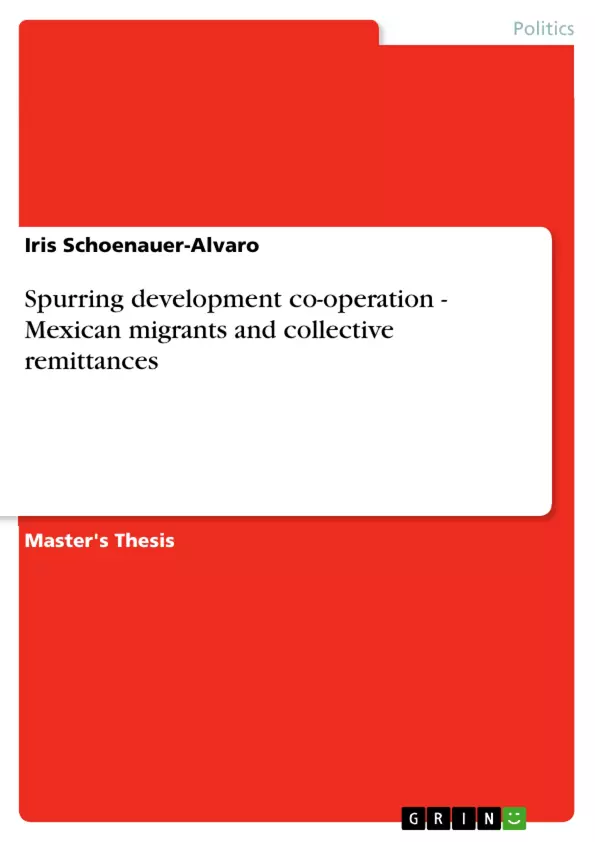In times of rising inequality levels coupled with the fact that many governments of the developing world fail to provide even the most basic public services to their citizens and that neither aid nor trade have so far succeeded in spreading wealth more evenly across the globe, complementary innovative approaches need to be devised that benefit ordinary people.
A myriad of root causes have resulted in ever-increasing international migration and, thus, in rising flows of remittances, which have already overtaken the worldwide amount of official development assistance. Whereas family remittances tend to be part of the recipient’s survival strategy, collective remittances may aim at regional development. Yet not only due to their rather modest share of total remittances but also because of the complexities of regional development itself, collective remittances will certainly not be a “magic wand”. They may,
however, make a potentially far-reaching contribution both with regard to low-scale development and popular participation.
This dissertation explores so-called “fund-matching schemes” in which the Mexican government provides additional financial resources for each dollar remitted by migrants as collective remittances. The increased pool of resources enables the implementation of a larger number of projects or of more resource-intense projects for which the improvement of the local infrastructure and human development are currently prioritised. Furthermore, an interesting co-operation between migrants and the state emerges, which - although it shows
some remnants of a traditionally authoritarian regime and isolated little cooperative attitudes among migrants - may positively influence Mexico’s political culture in the long run… if handled constructively.
Inhaltsverzeichnis (Table of Contents)
- Chapter 1: Introduction
- 1.1 Overview
- 1.2 Methodology
- 1.3 Chapter Structure
- Chapter 2: The International Context
- 2.1 Introduction
- 2.2 Migration
- 2.2.1 Historical Background, Root Causes and Migratory Trends
- 2.2.2 Effects of Emigration on Developing Countries
- 2.3 Remittances
- 2.3.1 Macro-economic Importance of Remittances
- 2.3.2 Remittance-promotion Programmes
- 2.4 Related Concepts
- 2.4.1 Civil Society
- 2.4.2 Social Capital
- 2.5 Conclusions
- Chapter 3: The Mexican Context
- 3.1 Introduction
- 3.2 Background Information on Mexico
- 3.2.1 General Information
- 3.2.2 20th Century History of Emigration to the US
- 3.3 Remittances
- 3.3.1 Macro-economic Importance of Remittances
- 3.3.2 Family Remittances, Collective Remittances and Productive Investments
- 3.4 Government Outreach Programmes
- 3.4.1 “Program for Mexican Communities Living Abroad\" and its Developments
- 3.4.2 Fund-matching Schemes
- 3.5 Mexican Hometown Associations in the USA
- 3.6 Conclusions
- Chapter 4: Case Study: 3-For-1 Fund-Matching Scheme
- 4.1 Introduction
- 4.2 Background Information on Zacatecas
- 4.3 Programme Analysis
- 4.3.1 Projects
- 4.3.2 Successes
- 4.3.3 Shortcomings
- 4.3.4 Policy Recommendations
- 4.4 Conclusions
- Chapter 5: Conclusions and Recommendations
- 5.1 Introduction
- 5.2 Migrants as Actors of Change
- 5.2.1 Development
- 5.2.2 Politics and Institutions
- 5.3 Recommendations for Further Research and Actions
Zielsetzung und Themenschwerpunkte (Objectives and Key Themes)
This dissertation examines the role of Mexican migrants in promoting development cooperation through collective remittances. It aims to analyze the impact of these remittances on development initiatives in Mexico, focusing on the case study of a 3-for-1 fund-matching scheme in Zacatecas. Key themes explored include:- The macro-economic importance of remittances
- The relationship between migration, remittances, and development
- The role of civil society and social capital in development cooperation
- The effectiveness of government outreach programs and fund-matching schemes
- The potential of collective remittances as a tool for promoting development
Zusammenfassung der Kapitel (Chapter Summaries)
Chapter 1 provides an overview of the dissertation, outlining the research methodology and chapter structure. Chapter 2 examines the international context of migration and remittances, exploring their historical background, root causes, and impact on developing countries. It also discusses the importance of remittances from a macro-economic perspective and the role of civil society and social capital in development cooperation. Chapter 3 focuses on the Mexican context, examining the historical background of Mexican emigration to the US and the macro-economic importance of remittances. It also explores the different types of remittances, including family and collective remittances, and the government's efforts to promote remittances and their productive investment. Chapter 4 delves into the case study of the 3-for-1 fund-matching scheme in Zacatecas, analyzing the program's successes, shortcomings, and policy recommendations.Schlüsselwörter (Keywords)
The dissertation focuses on the key themes of development cooperation, migration, remittances, civil society, social capital, and Mexico. It explores the potential of collective remittances as a tool for promoting development and analyzes the effectiveness of government outreach programs and fund-matching schemes in the Mexican context.Frequently Asked Questions
What are collective remittances?
Collective remittances are funds sent by groups of migrants (e.g., Hometown Associations) to their home communities to finance local development projects.
What is the "3-for-1" fund-matching scheme in Mexico?
It is a program where the Mexican government adds three dollars for every dollar remitted by migrants for community infrastructure and human development projects.
How do remittances compare to official development assistance?
Global remittance flows have already overtaken the total amount of worldwide official development assistance, highlighting their economic importance.
What is the role of Mexican Hometown Associations (HTAs)?
HTAs in the USA act as civil society actors that organize collective remittances and collaborate with the Mexican state on development initiatives.
Can collective remittances solve all regional development problems?
The dissertation notes they are not a "magic wand" but can make significant contributions to low-scale development and popular participation.
- Quote paper
- Iris Schoenauer-Alvaro (Author), 2003, Spurring development co-operation - Mexican migrants and collective remittances, Munich, GRIN Verlag, https://www.grin.com/document/112829



